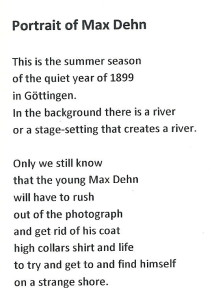Archive for the ‘Traditional Poetry’ Category
Entry 1356 — Another Visit to Of Manywhere-at-Once
Thursday, January 30th, 2014
Entry 1307 — “Portrait of Max Dehn”
Sunday, December 22nd, 2013
Below is a poem from an anthology I’m writing a review of.
It’s by Francisco Jose Craveiro de Carvalho as translated from the Portuguese by Manual Portela. All it tells us (with a nice touch of surrealistic fantasy) is that Dehn was an emigrant–but it does so with the same kind of inspired empathy with which Keats famously described Ruth, amidst the alien corn. It’s here because I like it, but more because I wanted to say something about the Reviewer’s Delight I felt when, in writing about it, I saw my way to giving a poet what I feel is a high (and appropriate) compliment while also again praising my old favorite, Keats. Such delights are what make reviewing worth doing no matter how difficult it is at times.
.
Entry 1294 — A Break from Difficult Art
Monday, December 9th, 2013
Today it’s back two centuries to Wordsworth’s “Lines Composed a Few Miles Above Tintern Abbey,” when he speaks of having felt
A presence that disturbs me with the joy Of elevated thoughts; a sense sublime Of something far more deeply interfused, Whose dwelling is the light of setting suns, And the round ocean and the living air, And the blue sky, and in the mind of man: A motion and a spirit, that impels All thinking things, all objects of all thought, And rolls through all things.
And this from his sonnet about the beauteous evening:
The gentleness of heaven broods o'er the Sea; Listen! the mighty Being is awake, And doth make with his eternal motion A sound like thunder--everlastingly.
In these two poems, Wordsworth, it seems to me, connects to what I am calling the Urceptual Under-Presence, although his conception of it differs from mine in important respects, and is much more vague than mine is–or perhaps I should say as I hope mine will be. This Under-Presence is what I think many identify as God. I think of it as something evolution gave us to cope with the vast meaninglessness of the universe–a personification of it we carry around in our heads it as a comprehensible being, false but soothing. But it is also a powerful–and valid–metaphor.
.

